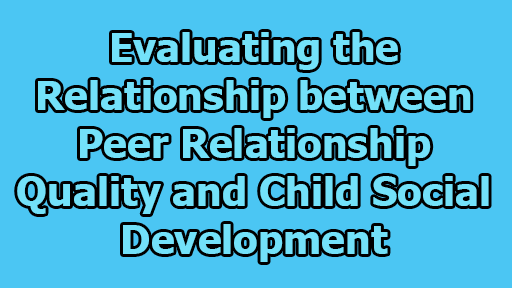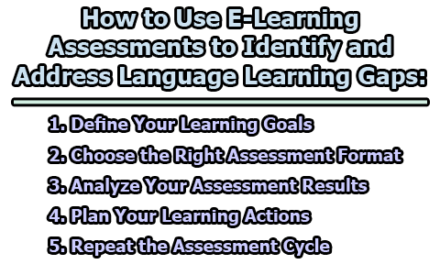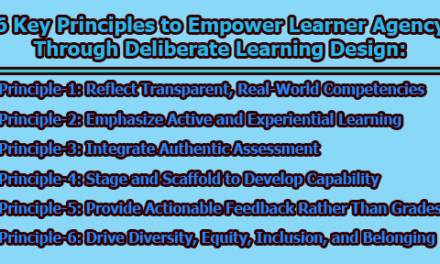Evaluating the Relationship between Peer Relationship Quality and Child Social Development:
Peer relationships are integral to a child’s development. From the early years of life, children begin to interact with their peers, developing important social skills and emotional regulation. The quality of these interactions with peers significantly influences a child’s social development. As such, understanding the relationship between peer relationship quality and child social development is essential. In the rest of this article, we will explore the following statement; “evaluating the relationship between peer relationship quality and child social development”.
Section 1: Peer Relationship Quality: An Overview:
Peer relationships encompass a wide range of interactions, from friendships to casual acquaintances. The quality of these relationships can be defined through various dimensions, including emotional support, conflict resolution, peer acceptance, and the overall satisfaction derived from these interactions. A child’s experiences with peers can be classified as either positive or negative based on these dimensions.
1.1 Positive Peer Relationships: Positive peer relationships are characterized by various attributes:
- Emotional Support: In positive peer relationships, children feel emotionally supported. They experience a sense of belonging, empathy, and understanding from their peers.
- Peer Acceptance: Positive peer relationships involve a sense of acceptance and inclusion. Children are more likely to feel valued and appreciated within their peer group.
- Social Competence: Healthy peer relationships often lead to improved social competence, as children learn effective communication, cooperation, and conflict resolution skills.
- Prosocial Behavior: Children in positive peer relationships are more likely to engage in prosocial behaviors, such as sharing, helping, and cooperating with their peers.
1.2 Negative Peer Relationships: Conversely, negative peer relationships are characterized by:
- Conflict and Aggression: Children may experience high levels of conflict and aggression in negative peer relationships, which can lead to stress and emotional turmoil.
- Rejection and Isolation: Negative peer relationships often involve rejection and isolation, causing emotional distress and feelings of loneliness.
- Reduced Social Competence: Children in negative peer relationships may struggle with social competence, as they encounter difficulties in resolving conflicts and building positive connections with peers.
- Delinquent Behavior: Negative peer relationships may increase the likelihood of engaging in delinquent or risky behaviors.
Section 2: Theoretical Frameworks: Understanding Peer Relationship Quality:
To evaluate the relationship between peer relationship quality and child social development, it is crucial to explore relevant theoretical frameworks. Several theories provide insight into how peer relationships impact child development.
2.1 Social Learning Theory: Social learning theory, proposed by Albert Bandura, emphasizes the role of observational learning and modeling in shaping behavior. Children observe and imitate the behaviors of their peers, both positive and negative. Positive peer relationships can serve as a source of prosocial modeling, contributing to the development of desirable social behaviors.
2.2 Attachment Theory: Attachment theory, developed by John Bowlby, highlights the significance of early emotional bonds, not only with caregivers but also with peers. Secure attachments with peers provide a sense of safety and support, which positively influences a child’s self-esteem and social development.
2.3 Social Development Theory: The social development theory, as formulated by Erik Erikson, posits that social development occurs in stages. Successful resolution of each stage’s challenges depends on the quality of social interactions. Peer relationships play a critical role in facilitating the development of trust, autonomy, and industry in children.
2.4 Sociocultural Theory: Lev Vygotsky’s sociocultural theory underscores the importance of social interactions and cultural context in cognitive and social development. Peer interactions contribute to a child’s Zone of Proximal Development, enabling them to learn from more competent peers and progress in their social development.
Section 3: Factors Contributing to Peer Relationship Quality:
Numerous factors influence the quality of peer relationships in children. These factors can be categorized into individual, family, and environmental levels.
3.1 Individual Factors:
- Temperament: A child’s temperament can influence their ability to form positive peer relationships. Children with easygoing and adaptable temperaments may find it easier to interact positively with peers.
- Social Skills: The development of social skills, including communication, empathy, and conflict resolution, is pivotal in establishing positive peer relationships.
- Self-Esteem: Children with higher self-esteem are often more confident in their interactions with peers and tend to attract positive relationships.
3.2 Family Factors:
- Parenting Style: The parenting style adopted by a child’s caregivers can significantly impact their ability to form positive peer relationships. Authoritative parenting, characterized by warmth and appropriate guidance, tends to promote healthy peer interactions.
- Sibling Relationships: Sibling relationships can serve as a training ground for peer interactions. Positive sibling relationships may enhance a child’s ability to establish positive peer relationships.
- Socialization: The extent to which a child is exposed to diverse social settings and experiences within the family can influence their readiness to engage with peers.
3.3 Environmental Factors:
- School Environment: The school environment plays a crucial role in shaping peer relationships. Inclusive and supportive school environments often lead to healthier peer interactions.
- Neighborhood and Community: The quality of the neighborhood and community can impact a child’s exposure to peer relationships and social opportunities.
- Socioeconomic Status: Socioeconomic status can influence the availability of resources and opportunities for social engagement, potentially affecting the quality of peer relationships.
Section 4: Impact of Peer Relationship Quality on Child Social Development:
The quality of peer relationships has a profound impact on various dimensions of a child’s social development. This section delves into the implications of peer relationship quality on different aspects of social development.
4.1 Emotional Development:
- Emotional Regulation: Positive peer relationships can contribute to better emotional regulation, as children learn to express and manage their emotions effectively.
- Self-Concept: A child’s self-concept is shaped by their interactions with peers. Positive feedback and acceptance from peers foster a healthy self-concept.
- Empathy and Compassion: Interacting with peers in positive relationships enhances a child’s capacity for empathy and compassion, as they learn to understand and support one another emotionally.
4.2 Cognitive Development:
- Language and Communication Skills: Peer interactions provide opportunities for language development and the refinement of communication skills.
- Problem-Solving Skills: Positive peer relationships encourage the development of problem-solving skills, as children collaborate to resolve conflicts and challenges.
- Perspective-Taking: Engaging with peers helps children develop the ability to consider others’ perspectives, enhancing their cognitive flexibility.
4.3 Behavioral Development:
- Prosocial Behavior: Positive peer relationships promote prosocial behaviors such as sharing, cooperation, and helping, contributing to a child’s moral development.
- Aggression and Conduct Problems: Negative peer relationships can increase the risk of aggressive behavior and conduct problems in children.
- Academic Performance: The quality of peer relationships can influence a child’s engagement in school and, subsequently, their academic performance.
4.4 Identity Formation: Positive peer relationships play a role in identity formation by providing opportunities for self-expression, exploration of interests, and the development of a sense of belonging within a peer group.
Section 5: Interventions and Strategies to Enhance Peer Relationship Quality:
To promote healthy peer relationships and enhance child social development, various interventions and strategies can be implemented. These approaches target individuals, families, schools, and communities.
5.1 Social Skills Training: Social skills training programs can help children develop the necessary interpersonal skills for positive peer interactions. These programs teach communication, empathy, conflict resolution, and problem-solving skills.
5.2 Parenting Programs: Parenting programs, such as those focusing on positive parenting and effective discipline, can equip caregivers with the skills needed to support their children in forming healthy peer relationships.
5.3 School-Based Initiatives: Schools can implement initiatives like peer mentoring programs, anti-bullying campaigns, and character education to create a supportive and inclusive environment that fosters positive peer relationships.
5.4 Community Engagement: Community programs and activities can provide children with opportunities to interact with peers from diverse backgrounds, promoting social development and understanding.
5.5 Counseling and Support Services: For children facing difficulties in peer relationships, individual or group counseling services can provide a safe space to address issues and develop coping strategies.
In conclusion, the quality of peer relationships is a critical factor in a child’s social development. Positive peer interactions contribute to emotional, cognitive, and behavioral growth, while negative peer relationships can have adverse effects. Understanding the factors that influence peer relationship quality and the implications of these relationships on child development is crucial for parents, caregivers, educators, and policymakers.
To foster healthier peer relationships and promote positive social development, it is essential to implement interventions and strategies at various levels, including individual, family, school, and community. By focusing on the enhancement of peer relationship quality, we can empower children to navigate the complex social landscape with confidence, empathy, and resilience, ultimately leading to more positive developmental outcomes.
So, peer relationships are an integral aspect of a child’s life and have a profound impact on their social development. It is our collective responsibility to ensure that children have access to positive peer interactions, providing them with the support, skills, and experiences needed to thrive socially and emotionally.
Frequently Asked Questions [FAQs]:
What is the significance of peer relationships in child social development?
Peer relationships are highly significant in child social development. They provide children with opportunities to learn social skills, emotional regulation, and important life lessons. Positive peer interactions can lead to enhanced emotional and cognitive development, while negative relationships can have adverse effects.
What are the key dimensions of peer relationship quality?
Peer relationship quality can be assessed through dimensions such as emotional support, peer acceptance, social competence, and prosocial behavior for positive relationships, and conflict, aggression, rejection, and delinquent behavior for negative relationships.
How do positive peer relationships impact a child’s emotional development?
Positive peer relationships contribute to emotional regulation, the development of a healthy self-concept, and the enhancement of empathy and compassion in children. These aspects are crucial for emotional well-being.
What are the cognitive benefits of positive peer relationships?
Positive peer relationships can improve language and communication skills, problem-solving abilities, and perspective-taking skills, all of which are essential for cognitive development.
How do negative peer relationships affect a child’s behavioral development?
Negative peer relationships may lead to aggressive behavior, conduct problems, and a negative impact on academic performance. These outcomes can hinder a child’s behavioral development.
What role does parenting play in shaping a child’s peer relationships?
Parenting styles and the quality of sibling relationships can significantly influence a child’s ability to form positive peer relationships. Supportive and authoritative parenting styles can encourage positive interactions.
What interventions can help improve peer relationship quality in children?
Interventions include social skills training, parenting programs, school-based initiatives, community engagement, and counseling services. These can be effective in promoting healthier peer relationships.
How can schools contribute to fostering positive peer relationships?
Schools can create inclusive and supportive environments through programs like peer mentoring, anti-bullying campaigns, and character education. These initiatives promote a culture of respect and collaboration among students.
Are peer relationships relevant in adolescence, or do they mainly impact younger children?
Peer relationships continue to be highly relevant during adolescence. While the nature of these relationships may change, they still play a crucial role in shaping social development, identity formation, and emotional well-being.
How can parents and caregivers support children in forming positive peer relationships?
Parents and caregivers can support children by teaching social skills, providing guidance on conflict resolution, and encouraging participation in social activities and extracurriculars. Open communication and empathy are also vital.
References:
- Rubin, K. H., Bukowski, W. M., & Parker, J. G. (2006). Peer Interactions, Relationships, and Groups. In W. Damon & R. M. Lerner (Eds.), Handbook of child psychology: Vol. 3. Social, emotional, and personality development (6th ed., pp. 571-645). John Wiley & Sons.
- Wentzel, K. R., & Erdley, C. A. (1993). Strategies for making friends: Relations to social behavior and peer acceptance in early adolescence. Developmental Psychology, 29(5), 819-826.
- Hartup, W. W. (1996). The company they keep: Friendships and their developmental significance. Child Development, 67(1), 1-13.
- Parker, J. G., & Asher, S. R. (1987). Peer relations and later personal adjustment: Are low-accepted children at risk? Psychological Bulletin, 102(3), 357-389.
- Bukowski, W. M., Hoza, B., & Boivin, M. (1994). Popularity, friendship, and emotional adjustment during early adolescence. New Directions for Child and Adolescent Development, 1994(65), 23-37.
- Ladd, G. W., & Troop-Gordon, W. (2003). The role of chronic peer difficulties in the development of children’s psychological adjustment problems. Child Development, 74(5), 1344-1367.
- Laursen, B. (2010). Conflict and social interaction in adolescent relationships. In M. J. Prinstein & K. A. Dodge (Eds.), Understanding peer influence in children and adolescents (pp. 201-226). The Guilford Press.
- Sroufe, L. A., Egeland, B., & Kreutzer, T. (1990). The fate of early experience following developmental change: Longitudinal approaches to individual adaptation in childhood. Child Development, 61(5), 1363-1373.
- Vitaro, F., Brendgen, M., & Tremblay, R. E. (2000). Influence of deviant friends on delinquency: Searching for moderator variables. Journal of Abnormal Child Psychology, 28(4), 313-325.
- Greenberg, M. T., Domitrovich, C., & Bumbarger, B. (2001). The prevention of mental disorders in school-aged children: Current state of the field. Prevention & Treatment, 4(1), 1a.

Library Lecturer at Nurul Amin Degree College










